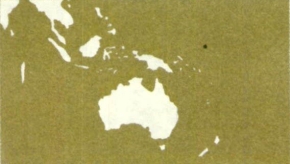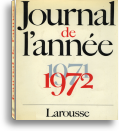Océanie
Australie

12 730 000. 2. 2 %.
Économie. PNB (68) 2 476. Production : G (68) 129 ; A (*69) 120 ; I (69) 138. Énerg. (*69) : 5 200. C.E. (68) : 11 %.
Transports. (*69) : 21 463 M t/km. (*69) : 3 677 000 + 949 900. : 1 074 000 tjb. (*69) : 7 404 000 000 pass./km.
Information. (68) : 61 quotidiens ; tirage global : 4 732 000. (68) : 2 650 000. (69) : 2 649 000. (66) : 638 700 fauteuils ; fréquentation : 37,5 M. (69) : 3 598 692.
Santé. (66) : 13 697. Mté inf. (68) : *17,8.
Éducation. (68). Prim. : 1 768 060. Sec. et techn. : 1 080 524. Sup. : 164 528.
Institutions. Fédération de 6 États (Commonwealth of Australia), indépendante le 1er janvier 1901. Constitution de 1901. Gouverneur général représentant la Couronne britannique : sir Paul Hasluck. Premier ministre : William McMahon.
Fidji

530 000. 29. 3 %.
Économie. PNB (69) 383. Énerg. (*69) : 407. C.E. (69) : 29 %.
Transports. (*69) : 9 200 + 4 000.
Information. (69) : 1 quotidien ; tirage global : 14 000. (69) : 45 000. (60) : fréquentation : 0,5 M. (69) : 16 021.
Santé. (68) : 230.
Éducation. (63). Prim. : 84 600. Sec. et techn. : 7 279. Sup. (62) : 467.
Institutions. État indépendant le 10 octobre 1970. Gouverneur général représentant la Couronne britannique : sir Robert Foster. Premier ministre : Kamisese Mara.
Nauru

7 000. 333. 5,2 %.
Économie. Énerg. (*69) : 5 167.
Information. (69) : *1 400.
Santé. (68) : 10.
Éducation. (68). Prim. : 1 396.
Institutions. République indépendante le 31 janvier 1968. Constitution de 1968. Président de la République : Hammer de Roburt. Les Affaires étrangères et la Défense sont assurées par l'Australie.
Nouvelle-Zélande

2 850 000. 11. 1,6 %.
Économie. PNB (69) 1 918. Production : G (68) 118 ; A (*69) 122 ; I (69) 142. Énerg. (*69) : 2 623. C.E. (69) : 23 %.
Transports. (*69) : 512 M pass./km, 2 763 M t/km. (*69) : 858 400 + 173 500. : 186 000 tjb. (*69) : 1 491 600 000 pass./km.
Information. (69) : 41 quotidiens ; tirage global : 1 047 000. (69) : 665 000. (69) : 617 000. (69) : 159 300 fauteuils. (69) : 1 202 590.
Santé. (68) : 4 345. Mté inf. (68) : 18,7.
Éducation. (68). Prim. : 509 841. Sec. et techn. : 179 922. Sup. : 50 433.
Institutions.
État indépendant en 1931. Des lois fondamentales tiennent lieu de constitution. Gouverneur général représentant la Couronne britannique : sir Arthur Porritt. Premier ministre : John Marshall.
Samoa Occidentales

150 000. 53. 2,6 %.
Économie. Énerg. (*69) : 100.
Information. (69) : *31 000. (66) : *300. (69) : 4 400 fauteuils ; fréquentation : 0,5 M.
Santé. (68) : 46.
Éducation. (68). Prim. : 26 261. Sec. et techn. : 9 400.
Institutions. État indépendant le 1er janvier 1962. Constitution de 1960. Chef de l'État : Malietoa Tanumafili. Premier ministre : Fiamë Mata'afa Faumuina Mulinu'u II.
Tonga

90 000. 129. 3,3 %.
Information. (69) : *7 900. (69) : 3 600 fauteuils.
Santé. (69) : 20.
Éducation. (65). Prim. : 16 424. Sec. et techn. : 9 491.
Institutions. État indépendant le 4 juin 1970. Monarchie.




